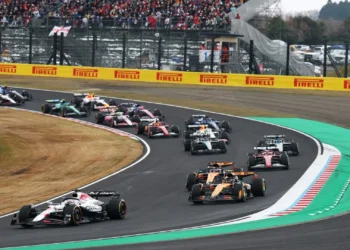McLaren Team Principal Andrea Stella has called on the FIA to reflect on the principles of fairness and proportionality in Formula 1 after Lando Norris was handed a 10-second stop-and-go penalty during the Qatar Grand Prix. Stella’s critique centered not on the punishment itself, but on its severity and the decision-making process behind it.
Norris Penalized in Dramatic Circumstances
Norris was on Verstappen’s tail, pushing for a lead challenge, when he failed to slow down under yellow flags at Turn 1—a violation of the regulations. The stewards deemed the infraction serious, particularly given the risks of not lifting during such conditions. The result? A penalty that dropped Norris from a podium contender to the back of the pack after the field bunched up following a safety car restart.
Norris fought valiantly, recovering to tenth and salvaging a point along with the fastest lap. But the penalty’s consequences for McLaren’s constructors’ title quest were monumental.
Stella: Penalty “Lacks Proportion and Specificity”
Stella, while acknowledging the need for some form of punishment, sharply criticized the harshness of the penalty and questioned its alignment with the specific circumstances.
“I think the penalty was deserved,” he admitted. “But the application of the penalty lacks both proportion and specificity. The penalty needs to be commensurate with the severity of the infringement.”
Stella pointed out that the yellow flag itself had been inconsistently applied, with signals being turned on and off during the incident. This, he argued, added unnecessary confusion and undermined the penalty’s justification.
“Is there an immediate danger for somebody? Is there a crash scene? It was not proportionate to the severity of the infringement.”
“A Dusty Rulebook and Simplistic Decision-Making”
Stella accused the FIA of taking a “simplistic” approach to penalizing Norris, implying that the decision was made by blindly adhering to a rulebook rather than considering the nuances of the situation.
“It looks like somewhere there must be a book with a lot of dust on the cover that was kind of taken out. ‘Let me see what it says, I apply this.’ It seems a little too simplistic.”
He also warned that overly rigid enforcement of penalties risks causing unintended consequences in a tightly contested championship.
Calls for an FIA Review
Stella urged the governing body to conduct a comprehensive review of how penalties are determined and their severity. While he refrained from directly criticizing new Race Director Rui Marques, he made it clear that McLaren expects significant improvements in the FIA’s operations.
“We expect that this case of applying such a severe penalty to that case will be reviewed by the FIA. There is certainly material for improvement.”
Championship Implications
The penalty significantly impacted McLaren’s constructors’ title challenge, leaving Ferrari just 21 points adrift heading into the season finale in Abu Dhabi. With the stakes higher than ever, Stella’s plea underscores the need for clarity and fairness in race governance.
“If we want fairness to be part of going racing in F1, the FIA needs to seriously consider the implications of their decisions.”
A Divisive Decision
As the dust settles on Qatar, the Norris penalty has reignited debate about consistency and context in F1 officiating. For McLaren, Abu Dhabi represents not only a chance to seal their first constructors’ title since 1998 but also a moment to hope the FIA learns from its missteps.










